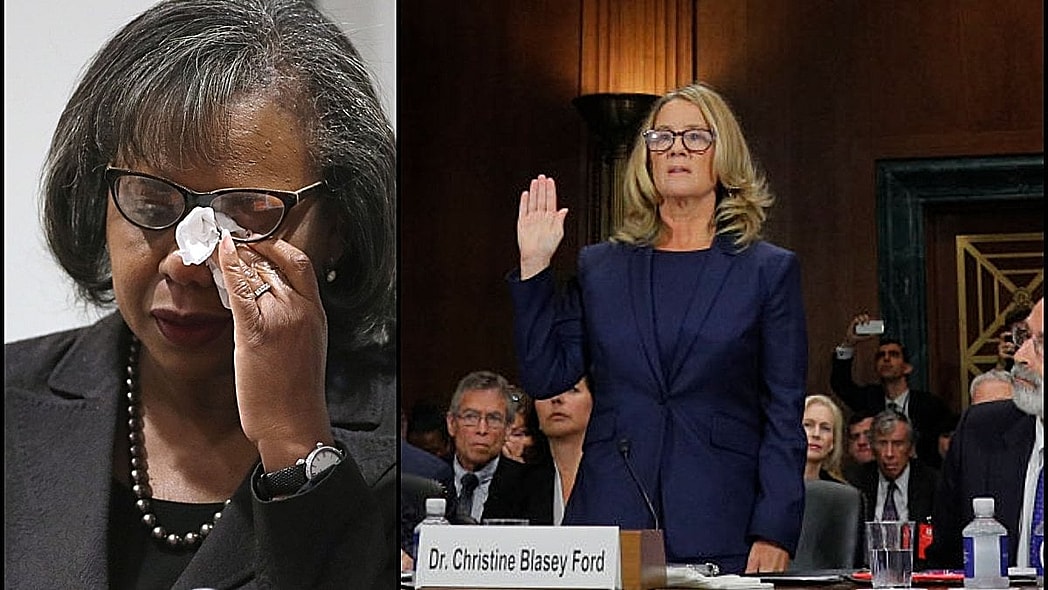No matter what you made of the circus that was the Supreme Court nomination hearing on Thursday, one fact is all but indisputable. Christine Blasey Ford was a compelling and sympathetic witness against Living Embodiment of White Male Privilege, Brett Kavanaugh.
The 51-year-old psychology professor risked the undeserved ridicule and scrutiny traditionally shown toward sexual assault victims; braved a fear of flying to travel to our nation’s capital; and subjected herself to the public spotlight, all for the benefit of some members of Congress who are reluctant to do the obvious thing and jettison a morally questionable candidate.
Adding to Ford’s considerable anguish, she endured weeks of resurrected trauma, most notably from the man SOMEBODY around these parts elected President. He besmirched her name, questioned the timing of her revelation about the alleged attempted rape she faced in 1982 and even defended her purported assailant as “one of the highest quality people” he’d ever met.
“I am here today not because I want to be,” Christine Blasey Ford said before launching into harrowing testimony that included how she felt while allegedly pinned to a bed as Kavanaugh tried to forcibly remove her clothing.
“I am terrified.”
That stirring remark, as well as her vivid description of an alleged attack she said shaped the trajectory of her life, are seemingly resonating in the court of public opinion. Rumor is that 45 himself, despite his usual bluster, is in a state of shookness because he didn’t realize Ford would come across as such a credible witness.
With disgust about Kavanaugh quickly rolling in from both sides of the political aisle and across gender lines, this could have been a moment of unity. It could have been a step toward true intersectionality, but of course, even in the Year of Our Lord 2018, that was too much to ask.
Cue the woefully ignorant, though not unexpected, media analyses rife with problematic comparisons between Ford’s testimony and that of the 1991 statements of Anita Hill against Supreme Court (In)Justice Clarence Thomas.
CNN pundit saying that Blasey-Ford’s testimony is more resonant bc — unlike Anita Hill who projected strength and poise — Blasey-Ford projected vulnerability.
Soo much to unpack there.
— Jawny Mathis. (@GeeDee215) September 27, 2018
CNN analyst Joan Biskupic roiled Twitter denizens describing Hill as stoic and “strong” in her testimony against Thomas. As my fellow Black women know, that “strong” adjective is laced with the deep and damaging stereotype of the invincible Black woman, impervious to emotional and physical trauma.
Meanwhile, Ford came off to both Biskupic and the LA Times’ David Lauter, respectively, as more “vulnerable” and more “visibly traumatized.” Biskupic even surmised that Ford could have a greater impact than Hill as a result.
Translation: White women’s tears continue to double as weapons of mass destruction.
In actuality, shifting discourse around sexual harassment and assault, not to mention the passage of nearly 30 years, is much more likely the reason that Ford’s testimony is being viewed by some as more sympathetic by the public. Hill herself said as much during a recent interview with the Associated Press.
READ MORE: Activists mark Laquan McDonald’s 21st birthday as trial continues for police officer who killed him
“A lot is different now,” Hill, told the AP. “A number of powerful men have been held accountable.”
Indeed, a side-by-side viewing of Ford’s testimony and Hill’s reveals very little difference, other than the obvious pigment of their skin.
You’ll see two professional women attired in blue suits. Both women provide vivid, disturbing details of the alleged incidents that prompted them to speak out. Both come across as painfully cognizant of what these public revelations will mean for their lives going forward. What seems to be lost on some people is that both are also emotional human beings; women who have been harassed and abused by powerful men. Two women, who gained nothing financially, by telling their truth publicly.
READ MORE: #BeGone: Melania Trump is bringing her ‘Be Best’ foolishness to Africa
As for Hill’s supposed stoicism, a culturally adept eye and ear can indeed detect the emotion behind her words. If anything, Black women can relate to what some might interpret as a cautious method of speech as so many of us have to “watch our tone” in a society that judges us quickly and unkindly and unfairly labels us as always angry.
At work, at school, talking to police, casual acquaintances and even strangers, we can never be too shrill or too loud. Our voices cannot tremble too much. As we know, the only thing more intimidating and off-putting to White folks is that of a strong Black woman is an angry one.
Kyra Kyles is a nationally known multiplatform media executive, author, and speaker on media diversity. In addition to her 20-plus years as a journalist, including a tenure as Editor-in-Chief of EBONY and a multimedia correspondent/columnist for the Tribune Company, Kyra is the Chicago-based co-founder of content development collective, Myth Lab Entertainment and a contributor to outlets including TheGrio and Bustle. Follow and interact with her via @thekylesfiles on Instagram, Facebook, and Twitter. That is, unless you’re some kind of troll or card-carrying member of #LawrenceHive


